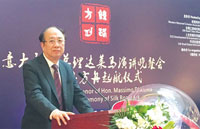Xinjiang enjoys unprecedented religious freedom: white paper
Updated: 2016-06-02 10:59
(Xinhua)
|
|||||||||
BEIJING - China on Thursday issued a white paper titled "Freedom of Religious Belief in Xinjiang," saying the freedom of religious belief in Xinjiang Uygur autonomous region today "cannot be matched by that in any other historical period."
Since the founding of the People's Republic of China (PRC) in 1949, the Constitutional principle of freedom of religious belief has been comprehensively implemented in Xinjiang, with the citizens' freedom of religious belief fully respected and believers' normal religious needs effectively met, said the white paper released by the State Council Information Office.
In Xinjiang, "the positive role of religious circles in promoting economic development and social stability is well displayed, the government's capability of administrating religious affairs is constantly strengthened, international exchanges in the religious field are being expanded, and the proliferation and spread of religious extremism is being effectively contained," it noted.
Historically, the white paper said, religious relations in Xinjiang were very complicated. "Religious wars and conflicts not only caused serious damage to the economy and society, but also brought grave disasters to the people. As a result, people lost freedom of faith."
After the PRC was founded, people of all ethnic groups in Xinjiang gained the freedom of religious belief, the white paper said, stressing respect for and protection of freedom of religious belief is a long-term basic national policy of the Chinese government.
"No citizen suffers discrimination or unfair treatment for believing in, or not believing in, any religion," it said.
At present, the major religions in Xinjiang are Islam, Buddhism, Protestantism, Catholicism and Taoism, according to the white paper.
Since the founding of the People's Republic of China (PRC) in 1949, the Constitutional principle of freedom of religious belief has been comprehensively implemented in Xinjiang, with the citizens' freedom of religious belief fully respected and believers' normal religious needs effectively met, said the white paper released by the State Council Information Office.
In Xinjiang, "the positive role of religious circles in promoting economic development and social stability is well displayed, the government's capability of administrating religious affairs is constantly strengthened, international exchanges in the religious field are being expanded, and the proliferation and spread of religious extremism is being effectively contained," it noted.
Historically, the white paper said, religious relations in Xinjiang were very complicated. "Religious wars and conflicts not only caused serious damage to the economy and society, but also brought grave disasters to the people. As a result, people lost freedom of faith."
After the PRC was founded, people of all ethnic groups in Xinjiang gained the freedom of religious belief, the white paper said, stressing respect for and protection of freedom of religious belief is a long-term basic national policy of the Chinese government.
"No citizen suffers discrimination or unfair treatment for believing in, or not believing in, any religion," it said.
At present, the major religions in Xinjiang are Islam, Buddhism, Protestantism, Catholicism and Taoism, according to the white paper.
Today's Top News
China looking forward to trade talks with EEU: MOC
Russia to promote EAEU-China economic cooperation
AIIB 'set to earn international trust, credibility'
EIB and AIIB to strengthen cooperation
Some 13,000 migrants saved, over 700 dead
Economists urge go-slow on EU's anti-dumping
Chinese investors eye European soccer goal
Rescue vessel eyed for the Nansha Islands
Hot Topics
Lunar probe , China growth forecasts, Emission rules get tougher, China seen through 'colored lens', International board,
Editor's Picks

|

|

|

|

|

|







